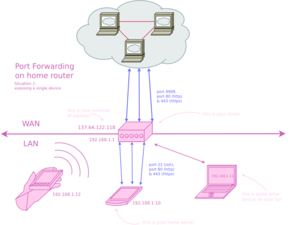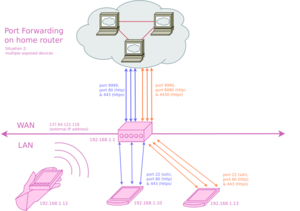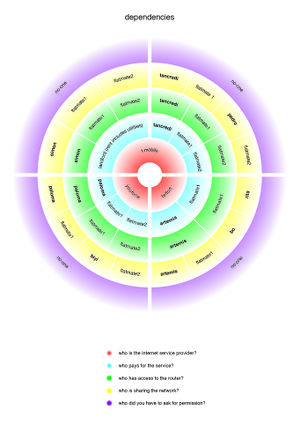Category:WttF
Reminder: don't forget to add [[Category:WttF]] to all the pages you make in relation to this special issue! Thanks :D
https://pad.xpub.nl/p/special_issue_8_pads_index
Welcome to the Federation
Special Issue 8
publishing in situated federated networks
For the 8th Special Issue, we will base our work around the idea of online federation to question* what federated publishing could be.
The trimester is roughly divided into two parts.
We will start the trimester with a deep dive into the practice of the homebrew server admin and study different social and material conditions of hosting material online. While self-hosting together, we will establish connections, host softwares, create tools and work on small prototypes to develop a practical and small scale understanding of online federation as a concept and its potential for novel publishing practices. Along the way, with the help of our self-hosted tools, we will document our understandings and questions, log our conversations and list our resources.
During the second part of the trimester we will change our scope and focus our attention to one particular emerging distributed online publishing protocol called ActivityPub. This protocol and the multiple projects that together constitute the ActivityPub network, will be our guide to ask (and answer?) questions about the relation between online publishing, communities, infrastructures and politics.
We will transform these questions into a collection of clients (interfaces) that interact with the ActivityPub network. These clients will situate themselves in the network and will therefore speak to/address a specific audience. This could be done in many ways, for example through automated tools that generate text, interfaces that filter content in a specific way, or a tool that can be used to access the network.
Depending on your publishing ideas, you will work on one (or more) clients (alone or together) that interact with the ActivityPub network. We would like to approach these clients as online digital zines, turning them into small but explicit and opinionated stand-alone publications that we present during the final launch in Varia in April.
*
How can federated services reaffirm the relation between social organization and technical infrastructure which was historically undone with the shift to web 2.0?
How can self-hosting together become an act of understanding what it means to become a node and relate to others?
What is the practice and shape of federated publishing and what can it be? How can we position the practice of design and publishing in the realm of federated networks?
How can we work with a protocol as a tool to study understandings of control and governance? How could federation be a tool to question our understanding of networks? How do federated networks differ from other forms of distributed networks?
What could be ways to interface a network, that translates its mechanisms, activities and attitudes?
If we start to publish anouncements, blog posts, photographs, video's and other types of media, in a federated way, how do we understand the federated status of content, flowing in between multiple nodes? What semiotic objects are we dealing with, if text is interrelated to multiple contexts, layouts and languages?
Our guests
Editors
Varia is a Rotterdam based initiative focused on working with, on and through everyday technology. At its core the initiative aims to be a social infrastructure from which to collaboratively facilitate critical understandings on the technologies that surround us. The initiative is a membership-based organisation striving to become a space for questions, opinions, modifications, help and action. https://varia.zone/
Roel Roscam Abbing is an artist and researcher whose work engages with the issues and cultures surrounding networked computation. He engages with themes such as network infrastructures, the politics of technology and do-it-yourself approaches. He holds an MA Networked Media from the Piet Zwart Institute in Rotterdam and a Fine Arts BA from the Willem De Kooning Academy. Currently he also works as a teacher in Digital Media at the department of Graphic Design in Artez, Arnhem. He is also a member of the homebrewserver.club and Varia. https://roelof.info
Manetta Berends is a graphic designer with an interest in networked publishing & free software. Her practice is rooted in practical investigations into the sociality of publishing software. Besides working on commissions, projects and workshops, Manetta is one of Varia's members. http://www.manettaberends.nl
Guests
Lídia Pereira is an indepent designer, artist and researcher based in Rotterdam, NL. She is the founding editor of the Pervasive Labour Union zine, a project which not only offers a low-barrier entry level for contributors wishing to express their views on the political economy of the internet, algorithmic governance and labour in and around corporate social networks, but also a low-barrier entry level for those wishing to become acquainted with such debates. ilu.servus.at
Florian Cramer is a reader in 21st Century Visual Culture/Autonomous Practices at Willem de Kooning Academy, Rotterdam, Netherlands. http://floriancramer.nl/
Aditya Mandayam The Indo-Polish artist, writer, and musician Aditya Mandayam leads Brud as Benevolent Dictator. Brud are heuristics that gained sentience in the Twenty-Teens. In recent years Brud's practice taken a turn towards the esoteric Hindu traditions of Tantra. Brud's operatic oeuvre is a *gesamtkunstwerk* of sculpture, theater, cinema, music, light, text, sound, and (moving) image. Mandayam's latest book, *Syzygy*, is a murder-mystery set in the White Cube and will be published by Boabooks this spring. Recent exhibitions include Art in General, New York, Kunstverein Munich, and Futura, Prague. https://brud.xyz
Seminar with Florian Cramer
In three sessions, we will
(a) study precursors of distributed and federated publishing in the experimental arts, particularly in 1970s Mail Art (Ray Johnson's New York Correspondance School, General Idea's FILE magazine);
(b) study how historically, decentralized communication has been thought of as immunization against monopolism, totalitarianism and propaganda - and to which degrees current social media falsify this assumption;
(c) re-read McLuhan's definition of the medium as the message, reconstruct its influence on media arts and activism - and criticize it from a contemporary point of view.
Schedule
We will start our sessions at 11:00h.
Week 1
Tuesday 8 January
- morning: Special Issue #8 introduction + discuss readings
- afternoon: Infrastructure introduction: creating a local network of servers while keeping track of terminology and concepts in a shared jargon[1][2] file
[1]: https://www.dourish.com/goodies/jargon.html
[2]: http://www.catb.org/~esr/jargon/html/index.html
Readings
The reading questions are meant to guide you through the text, so keep them in mind when reading the text.
Write down concepts that are new to you or difficult to grasp so they can be discussed in class.
Chantal Mouffe, Art & Democracy
https://readingpublicimage.files.wordpress.com/2012/04/mouffe_open14_p6-151.pdf
* What does the author mean by 'Agonism' * What does the author mean by 'Hegemony' * What does the author see as a 'Critical art practice'? * What four forms of 'critical art practices' does the author propose? * What is a critical art practice to you? Where could that practice take place?
Brian Larkin, The Politics And Poetics of Infrastructure
https://sci-hub.tw/10.1146/annurev-anthro-092412-155522
This text is meant as a general introduction to thinking about infrastructure for Anthropologists but it is a very good condensed overview of different approaches to interpreting infrastructure.
* What infrastructure are you currently using to go through this material? What systems are part of that infrastructure? * What is meant by the 'poetics of infrastructure?' * Why is discussing an infrastructure a categorical act? What is the consequence of this act of categorization? * What can be considered as a difference between a technology or system and an infrastructure? * How can an infrastructure operate as an aesthetic or 'fantastical' object?
Sarah Friend, Decentralization and Its Discontents
https://www.youtube.com/watch?v=Km6EYsBYAlY (documentation of talk during Radical Networks, Berlin)
Homebrew homework (for next week):
Prepare for the infrastructour.
- find out the location of your home router
- figure out if you have physical access to it
- figure out the password of your router
- make sure there are free ethernet ports
- make sure there is power available next to your router (for your server)
Week 2
Tuesday 15 January
- all day: Homebrewserver infrastructour
We will do a city bike tour visiting all your houses to help install your homebrew server and put them online!
We will take a look at the particularities of different hosting situations and help each other build the diy infrastructure. In the process we will keep a log of self-hosting anecdotes, experiences, questions and routers together.
Documenting the infrastructour
Qs during the day:
Who is your provider?
Where is the server?
What is the server?
What is it called?
Who or what else is on the LAN?
Do you have access to the router?
Were is it?
Is it shared?
How difficult was it to get access?
Whose permission did you need?
For each server, we will:
- try connect your server to your home router using an ethernet cable and forward port 80, 443 and 22. How this works is different for every type of router, do a search for yours. Note down what did or didn't work.
- find out your home router's external IP address and note it down.
Readings
- Feminist Server Manifesto (2014) -> https://pad.constantvzw.org/p/feministserver (up to line 32)
- What is a federated network? - http://networkcultures.org/unlikeus/resources/articles/what-is-a-federated-network/
Week 3
Tuesday 22 January / Joined by Lídia
- morning: What is federation?
- afternoon: Federated publishing prototypes
Week 4
Tuesday 29 January
- morning: Federated publishing prototypes + with guest Aditya Mandayam:
- afternoon: lecture from Aditya Mandayam + more federated publishing prototypes
In his talk titled *On Worldmaking with Brud* Mandayam will introduce Brud's recent artworks including *Juju*, a Human Modular Synthesiser, and Ooze.News, a journal of kleptoeconomics.
Readings
The reading questions are meant to guide you through the text, so keep them in mind when reading the text.
Write down concepts that are new to you or difficult to grasp so they can be discussed in class.
homebrewserver.club, Have you considered the Alternative?
https://homebrewserver.club/have-you-considered-the-alternative.html / http://ilu.servus.at/issue9.html
* How can we situate the authors' claim that there are no alternatives? * According to the article, why does cryptography not fully address privacy-related concerns? * What justifies the authors' choice to advocate for alternative approaches, rather than particular apps? * How can 'scale and trust' be understood within the context of federated alternatives?
Zach Blas, Contra-Internet
https://www.e-flux.com/journal/74/59816/contra-internet/
* According to the author, what is the difference between 'disappearing the internet' and 'killing the internet'? * Is it accurate to establish a comparison between the internet and capitalism? Why? * How can we practically explore and perform the paranode as a concept?
Ulises Carrion, The New Art of Making Books
https://monoskop.org/images/4/4e/Carrion_Ulises_Second_Thoughts.pdf
Peter Blasser, An Essay on Worldmaking in Plumbutter
http://www.ciat-lonbarde.net/plumbutter/index.html
Aditya Mandayam, Crux of the Ooze
https://brud.xyz/docs/crux-of-the-ooze.pdf
Week 5
- 04 Feb Mastodon Bots
Tuesday 5 February
- morning: Federated publishing prototypes
- afternoon: Federated publishing prototypes
Week 6
Tuesday 12 February
- morning:
- afternoon:
16:30h: Collective wrap up of first part of the trimester - with Roel, Manetta, Florian, and Lídia
Wednesday 13th of February
- Lídia & Steve
Rob Horning, Social Media is Not Self Expression
https://thenewinquiry.com/blog/social-media-is-not-self-expression/
* What is meant by subjectivation? Why does Rob Horning claim that 'being yourself' is limiting? * Why does the author claim that identity is 'a series of ads for a product that doesn't exist'? Why is this process anxiety inducing? * Why is going offline an insufficient way to combat the problems pointed by the author? * What does the author suggest as a possible way out of the trap of capitalist subjectivity?
Yuk Hui and Harry Halpin, Collective Individuation: The Future of the Social Web
http://citeseerx.ist.psu.edu/viewdoc/download?doi=10.1.1.442.2144&rep=rep1&type=pdf
* What is a sociogram and what function does it serve? * How do we situate the authors' understanding of social networking analysis as an 'extreme expression of social atomism'? What are the consequences of this process? * According to the authors, does decentralization suffice in order to escape social atomism? Why? * In the authors' opinion, what would a genuine alternative to atomized social networking produce and how could this be achieved?
Christian Fuchs, Sustainability and Community Networks
http://fuchs.uti.at/wp-content/SDCommNet.pdf [we will be mostly discussing the tables on pages 17-19]
Thursday 14 February
- all day: Seminar with Florian
Week 7
No class, studyweek
Week 8
No class, spring vacation
Week 9
Tuesday 5 March
- morning:
- afternoon:
Thursday 7 March
- all day: Seminar with Florian
Week 10
Tuesday 12 March
- morning:
- afternoon:
Wednesday 13th of March
- all day: Lídia Pereira editing
Week 11
Tuesday 19 March
- morning:
- afternoon:
Thursday 21 March
- all day: Seminar with Florian
Week 12
Tuesday 26 March
- morning:
- afternoon:
Wednesday 27th of March
- all day: Lídia editing
Week 13
Tuesday 2 April (optional)
- morning:
- afternoon:
Thursday 4 April
- evening: Special Issue 8 launch @ Varia (tbc.)
Pages in category "WttF"
The following 13 pages are in this category, out of 13 total.



